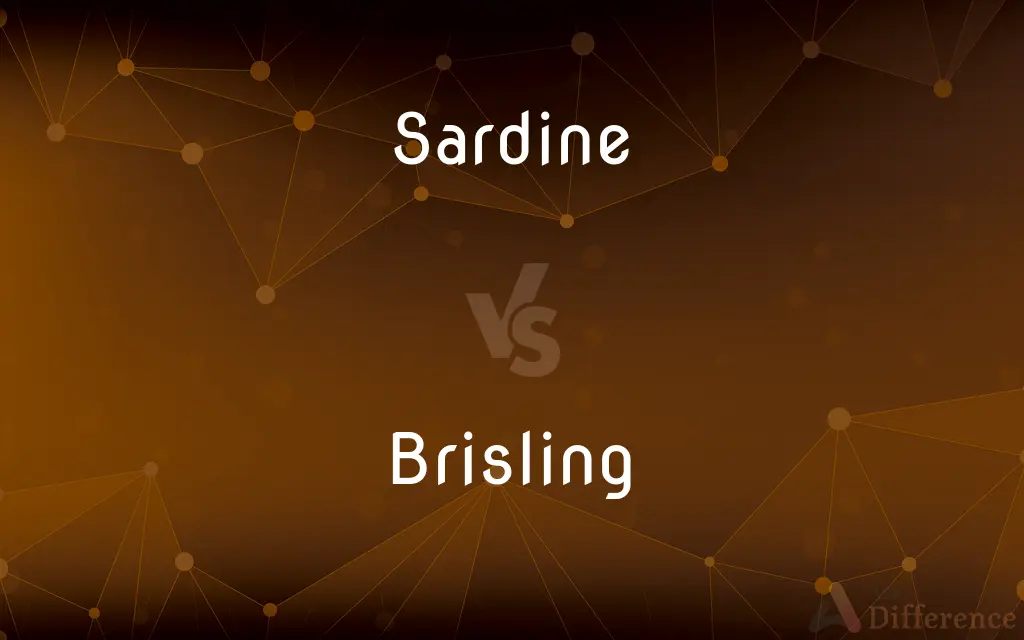Sardine vs. Brisling — What's the Difference?
Edited by Tayyaba Rehman — By Maham Liaqat — Updated on April 7, 2024
Sardines are small, oily fish widely consumed globally, known for their nutritional value, while brisling, a type of small herring, is prized for its delicate flavor, especially when canned as sardines in some regions.

Difference Between Sardine and Brisling
Table of Contents
ADVERTISEMENT
Key Differences
Sardines refer to several small, oily fish species within the herring family, popular for their taste and health benefits, including high omega-3 fatty acids. Brisling, on the other hand, is specifically a small herring found in the North Atlantic, known for its particularly fine quality and taste when canned. This distinction highlights not just the biological differences but also the culinary preferences that vary regionally.
While sardines are harvested and consumed worldwide, with a strong presence in Mediterranean cuisines, brisling is often considered a premium variety of small fish, particularly sought after in Northern Europe. The global reach of sardines as a food source contrasts with the more localized appreciation of brisling, indicating varied cultural and dietary practices.
In terms of preparation, sardines can be eaten fresh, but are commonly found canned, smoked, or preserved in oil or sauce. Brisling, although also versatile, is most renowned for being canned in high-quality olive oil, sometimes labeled as "sardines" in parts of Europe and North America, demonstrating the overlap in terminology based on processing methods rather than species alone.
The nutritional profiles of both sardines and brisling are similar, as they are rich in essential nutrients like omega-3 fatty acids, protein, and vitamin D. However, the specific taste and texture of brisling, often described as more delicate than that of sardines, can influence their use in culinary applications, with brisling being a preferred choice for gourmet products.
Market-wise, sardines are a staple in many diets and are widely available in various forms, making them accessible to a broad audience. Brisling, while also accessible, tends to be marketed as a premium or specialty product, reflecting its status in the culinary world and possibly affecting its price and availability.
ADVERTISEMENT
Comparison Chart
Species
Various species within the herring family
A specific type of small herring
Global Distribution
Worldwide
North Atlantic
Culinary Use
Fresh, canned, smoked
Preferred canned in olive oil
Taste & Texture
Rich, oily
Delicate, fine quality
Market Position
Staple food, widely available
Premium or specialty product
Compare with Definitions
Sardine
A small, oily fish widely consumed.
Fresh sardines grilled with lemon are a summer delight.
Brisling
A type of small herring known for its fine quality.
Canned brisling in olive oil is considered a delicacy.
Sardine
Rich in omega-3 fatty acids.
Eating sardines regularly supports heart health.
Brisling
Often labeled as "sardines" when canned.
Premium brisling is sometimes found in cans labeled as sardines.
Sardine
A global dietary staple.
Sardines are an essential protein source in many cultures.
Brisling
Delicate flavor and texture.
The delicate taste of brisling makes it a favorite among gourmet food lovers.
Sardine
Versatile in cuisine.
Sardines are used in salads, pastas, and as pizza toppings.
Brisling
Prized in Northern European cuisine.
Brisling is often served smoked with crackers.
Sardine
Commonly canned food.
Canned sardines are a pantry staple for quick meals.
Brisling
Marketed as a specialty product.
Brisling commands a higher price due to its superior quality.
Sardine
"Sardine" and "pilchard" are common names that refer to various small, oily forage fish in the herring family Clupeidae. The term "sardine" was first used in English during the early 15th century and may come from the Mediterranean island of Sardinia, around which sardines were once abundant.The terms "sardine" and "pilchard” are not precise, and what is meant depends on the region.
Brisling
See sprat.
Sardine
Any of various edible fishes of the family Clupeidae that are frequently canned, especially small herrings of western Atlantic waters and Sardina pilchardus of European waters.
Brisling
A sprat (small herring)
Sardine
Any of various other small, silvery, edible freshwater or marine fishes.
Brisling
A small fatty European fish; usually smoked or canned.
Sardine
To pack tightly; cram
"The bars are sardined with hungry hopefuls" (Gael Greene).
Brisling
A small herring (Clupea sprattus) processed like a sardine.
Sardine
Any one of several species of small herring which are commonly preserved in olive oil or in tins for food, especially the pilchard, or European sardine Sardina pilchardus (syn. Clupea pilchardus). The California sardine Sardinops sagax (syn. Clupea sagax) is similar. The American sardines of the Atlantic coast are mostly the young of the Atlantic herring and of the menhaden.
Brisling
Small fatty European fish; usually smoked or canned like sardines
Sardine
(obsolete) carnelian
Brisling
Small herring processed like a sardine
Sardine
(figurative) Someone packed or crammed into a small space.
Sardine
To fish for sardines
Sardine
To pack or cram together tightly.
Sardine
Any one of several small species of herring which are commonly preserved in olive oil for food, especially the pilchard, or European sardine (Clupea pilchardus). The California sardine (Clupea sagax) is similar. The American sardines of the Atlantic coast are mostly the young of the common herring and of the menhaden.
Sardine
See Sardius.
Sardine
Small fatty fish usually canned
Sardine
Any of various small edible herring or related food fishes frequently canned
Sardine
A deep orange-red variety of chalcedony
Sardine
Small fishes found in great schools along coasts of Europe; smaller and rounder than herring
Common Curiosities
Can brisling be called sardines?
Yes, in some regions, brisling canned in oil is labeled and sold as sardines.
What makes sardines a staple in many diets?
Their wide availability, affordability, and nutritional value make sardines a staple food in various cultures.
Why are brisling considered a delicacy?
Brisling is prized for its delicate flavor and texture, making it a preferred choice for gourmet canned fish.
Are sardines healthy to eat?
Yes, sardines are rich in essential nutrients like omega-3 fatty acids, protein, and vitamin D, making them a healthy dietary choice.
What is the main difference between sardines and brisling?
Sardines are a group of small, oily fish species, while brisling refers to a specific type of small herring, noted for its fine quality.
Is there a taste difference between sardines and brisling?
Brisling is often described as having a more delicate taste and finer quality than sardines.
What are some common culinary uses for brisling beyond canning?
Brisling is also enjoyed smoked, served with crackers or bread as a light appetizer or snack.
Are brisling more expensive than sardines?
Due to their perceived higher quality and delicacy, brisling can be more expensive than some types of sardines.
What is the nutritional comparison between sardines and brisling?
Both are similar in nutritional content, being rich sources of omega-3 fatty acids, protein, and vitamin D.
How are sardines typically prepared and consumed?
Sardines can be eaten fresh, grilled, canned, or preserved in oil or sauce, showing their versatility in culinary uses.
How do environmental factors influence the availability of sardines and brisling?
Factors like overfishing, pollution, and climate change can affect the populations and availability of both sardines and brisling, impacting their presence in global markets.
Can both sardines and brisling be used interchangeably in recipes?
While they can be used interchangeably in many recipes, the finer quality of brisling may be preferred for certain gourmet dishes.
What are the benefits of including sardines or brisling in one's diet?
They offer numerous health benefits, including improving heart health, providing essential nutrients, and supporting brain function.
Why are sardines often canned?
Canning preserves their nutritional value and extends their shelf life, making them a convenient and healthy food option.
How does the canning process affect the taste of brisling?
Canning in high-quality olive oil can enhance the delicate flavor of brisling, making it a sought-after canned product.
Share Your Discovery

Previous Comparison
Ra vs. Jesus
Next Comparison
Suffocation vs. SmotherAuthor Spotlight
Written by
Maham LiaqatEdited by
Tayyaba RehmanTayyaba Rehman is a distinguished writer, currently serving as a primary contributor to askdifference.com. As a researcher in semantics and etymology, Tayyaba's passion for the complexity of languages and their distinctions has found a perfect home on the platform. Tayyaba delves into the intricacies of language, distinguishing between commonly confused words and phrases, thereby providing clarity for readers worldwide.















































